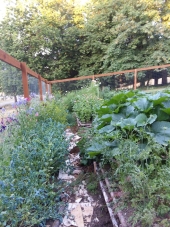




 1
1








'Theoretically this level of creeping Orwellian dynamics should ramp up our awareness, but what happens instead is that each alert becomes less and less effective because we're incredibly stupid.' - Jerry Holkins
















Roberta Wilkinson wrote:Can't speak for Nicole, but we've got tons of pollinators here. The woods are abuzz April through September, at least.




'Theoretically this level of creeping Orwellian dynamics should ramp up our awareness, but what happens instead is that each alert becomes less and less effective because we're incredibly stupid.' - Jerry Holkins




Mediterranean climate, hugel trenches, fabulous clay soil high in nutrients, self-watering containers with hugel layers, keyhole composting with low hugel raised beds, thick Back to Eden Wood chips mulch (distinguished from Bark chips), using as many native plants as possible....all drought tolerant.
 1
1




'Theoretically this level of creeping Orwellian dynamics should ramp up our awareness, but what happens instead is that each alert becomes less and less effective because we're incredibly stupid.' - Jerry Holkins




Dillon Nichols wrote:Hm, that's an interesting thought, but if true would indicate that the native trailing blackberries(Rubus ursinus, for clarity) are *very* sensitive to climate change, since this is their home territory. As for my 'Cascade berries', the theory is they are a cross between Loganberry and Rubus ursinus... and one of Loganberry's parents was also Rubus ursinus, so it makes sense that they share many traits.
Rubus ursinus *is* dioecious, but as long as the same cane is producing some actual berries as well as the husks, this doesn't seem like the whole answer...
I checked with the lady running this site http://www.garden-blessings.com/Pages/CascadeBlackberryPlants.aspx
She hasn't had this problem on any of her cascade berry canes; in fact, she says she gets 10 flats of berries from 8 mature plants, which is ludicrously better than ours have ever managed. So it certainly appears to me that this is a problem with my site or plants, rather than just the way things are for this cultivar...




 1
1




Mediterranean climate, hugel trenches, fabulous clay soil high in nutrients, self-watering containers with hugel layers, keyhole composting with low hugel raised beds, thick Back to Eden Wood chips mulch (distinguished from Bark chips), using as many native plants as possible....all drought tolerant.




Cristo Balete wrote:Yeah, stress and overcrowding can cause that to happen, especially if there is less ground water or drying out/ inconsistent water during the winter/early spring. I try to keep it to 6-8 canes every 10-12 feet of producing vines with room at the bottom wire for next year's growth.
It did say that Cascades are good in zones 7-9, and I wouldn't be surprised if some areas had close to Zone 10 temps late winter/early spring. Maritime tends to be cooler because of the fog, so that may be why really coastal Cascade berries did better.




I also mulch each bed with straw to keep the weeds down and the moisture from evaporating during the summer. During berry production I water after each picking, usually every three to five days. At other times during the spring and summer, I water once a week; more often if it has been extremely hot for a number of days.




'Theoretically this level of creeping Orwellian dynamics should ramp up our awareness, but what happens instead is that each alert becomes less and less effective because we're incredibly stupid.' - Jerry Holkins
 1
1




 1
1




How do you keep the canes to a minimum? Mine spread quite happily, and I'm currently using that power to have them out-compete the salmonberry, Himilayan blackberrry and Evergreen blackberry that I don't want. Would it be enough to just cut the extra trailing blackberry at ground level? Won't they just grow right back up?
Also, do you know how much the berries need to be watered, or indications that they aren't getting enough water? Thank you!
Mediterranean climate, hugel trenches, fabulous clay soil high in nutrients, self-watering containers with hugel layers, keyhole composting with low hugel raised beds, thick Back to Eden Wood chips mulch (distinguished from Bark chips), using as many native plants as possible....all drought tolerant.




 2
2




Mediterranean climate, hugel trenches, fabulous clay soil high in nutrients, self-watering containers with hugel layers, keyhole composting with low hugel raised beds, thick Back to Eden Wood chips mulch (distinguished from Bark chips), using as many native plants as possible....all drought tolerant.




Cristo Balete wrote:Nicole, do you mean by "duck bedding" wood shavings? Do you know what kind of wood it is? Or just straw? Yes, aging is best for all wood products, plus nitrogen to get the carbon/nitrogen mix going.
My berries are doing really well, and there was normal rainfall which gave them more of an irrigation than a soaking, which may have released nutrients that had been caught up in the drought-ridden soil. I had been watering, but the plants always respond better when Mother Nature does it. I am going to treat my berries as heavy feeders and heap the compost/weed mulch/rotted manure around them a couple times of year. Of course the new growth is next year's berries, so I'll have to wait a year to reap the benefits of last winter's rain.
Definitely get the canes out of there that had berries last year, even if they have leaves and flowers, they are sucking energy away from the canes that will produce.




Mediterranean climate, hugel trenches, fabulous clay soil high in nutrients, self-watering containers with hugel layers, keyhole composting with low hugel raised beds, thick Back to Eden Wood chips mulch (distinguished from Bark chips), using as many native plants as possible....all drought tolerant.
 2
2




Nicole Alderman wrote:I've been trying to remove the old canes, but since my patches aren't trellised in any way, it's really hard to remove the old canes as the new ones have invariably grown over the "spent" canes. In the areas where they are trellised, I've been removing the old canes, but it's really hard on the mounds of blackberries. I don't really have the time to spend scarring my arms digging out old bramble and ruining the newer growth while I do it. So, for now in these cases, I'll just take out the small canes and give them all as much duck bedding as possible.








Roberta Wilkinson wrote:We've observed the same thing here. Last spring we got really excited because there were tremendous numbers of flowers on the trailing blackberries at the bottom of the yard. Come summertime though... nada. Just like your pictures.
Some, elsewhere, do fruit, and they're delicious, hence the excitement.
They're dioeocious, and I think the "duds" are the flowers of male plants. If you don't have to make fruit, you can put a lot of energy into flowers, hence the phenomenon of the most impressively flowered patches amounting to nothing. They're important though, since you need them to pollinate your fruiting females. I'm not sure of this, it's just the conclusion I came to and seems to make sense.
D Nikolls wrote:I can't tell for sure from the pictures, but it looks like the same problem we've observed on our cascade berries, which are a blackberry hybrid.
I do not think this is a case of a male plant, because the same vine would yield some successful berries. Am I correct that this is the same in your case, Nicole?
Trailing blackberry is a native perennial, low trailing shrub. Its trailing or climbing stem is armed with tiny, slender, hooked spines. This species produces male and female flowers borne on separate plants that are white or pink with elongated petals. Both flowers are five petaled. Trailing blackberry produces edible berries in open, sunny areas from April to August.

|
I am not a spy. Definitely. Definitely not a spy. Not me. No way. But this tiny ad ...
Learn Permaculture through a little hard work
https://wheaton-labs.com/bootcamp
|



